A mountaineer with no fear has no judgement
– Lou Dawson |
Baboquivari – 7,734 feet
This sacred spire inspires mountaineers and residents alike. Visible from Tucson’s thirsty arms, this stunning sentinel watches over the Sonoran desert. |
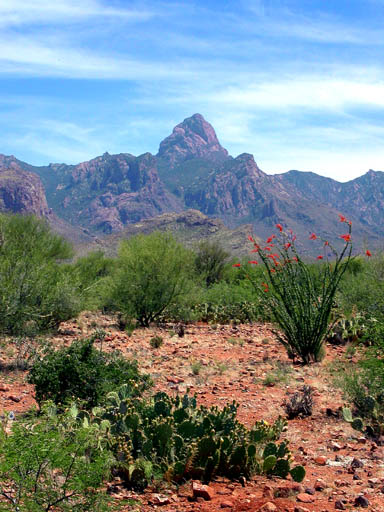 |
Baboquivari from the west |
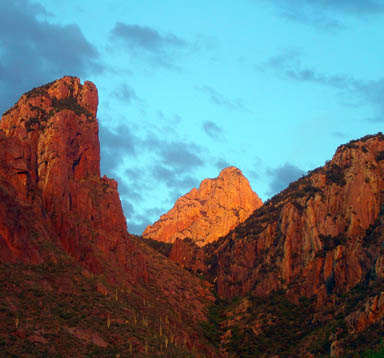 |
Viewed from the Baboquivari campground, Baboquivari broods beyond it’s lower ridges |
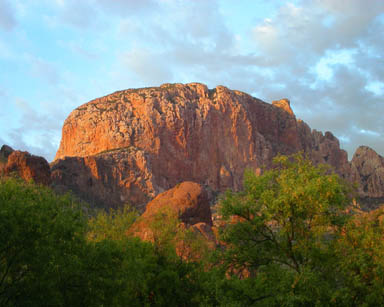 |
Rock formations typical of the area |
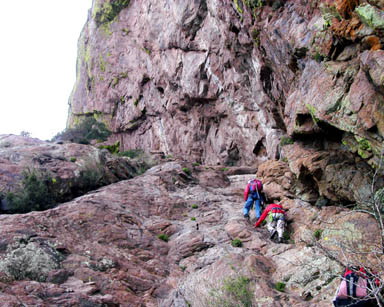 |
Gary Hoover and Charlie Winger starting up the ramp |
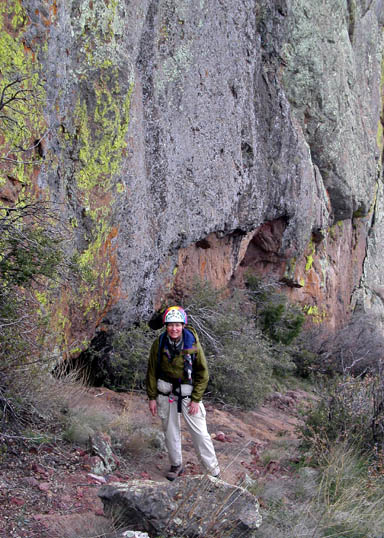 |
Jennifer on the upper ramp |
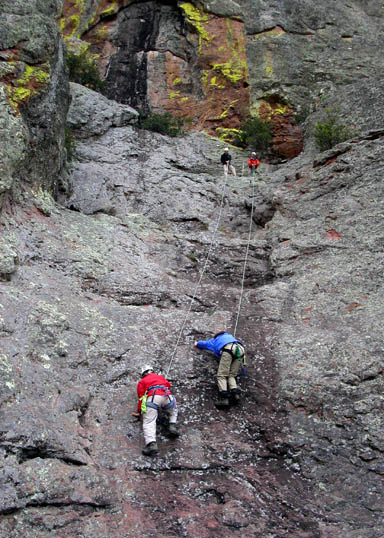 |
Diane Winger (lower left) and Susan Cooper climb Babo’s crux pitch belayed by Gary Hoover (upper left) and Charlie Winger
The Sierra Club rates this pitch Class 4, but Gerry rates the 3-move sequence that Susan is negotiating Class 5.3 |
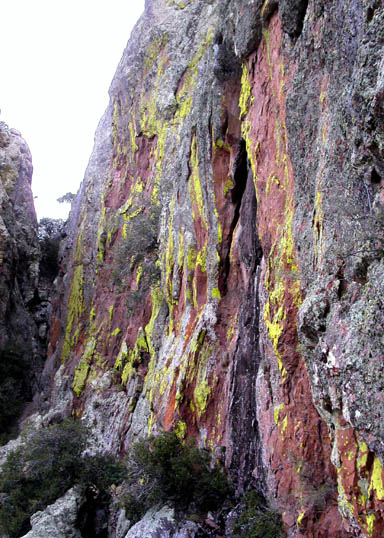 |
The colorful wall above the crux pitch |
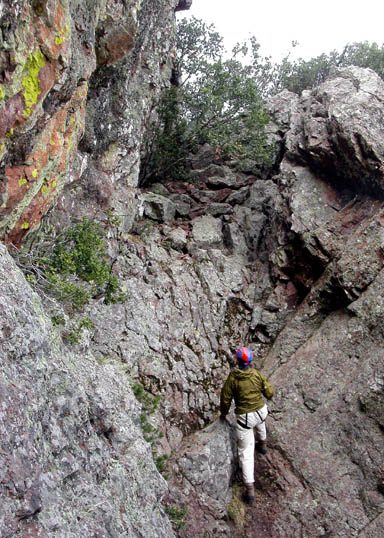 |
Jennifer scrambling above the crux pitch toward the summit |
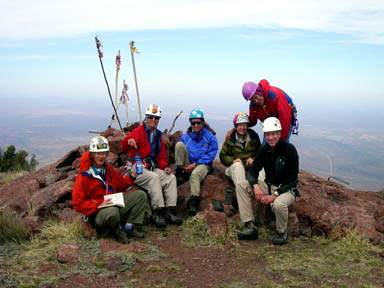 |
The senile six on the summit - L-R: Charlie Winger, Diane Winger, Susan Cooper, Jennifer Roach,
Jim Long and Gary Hoover
The average age of our senior sojourn was 57 |
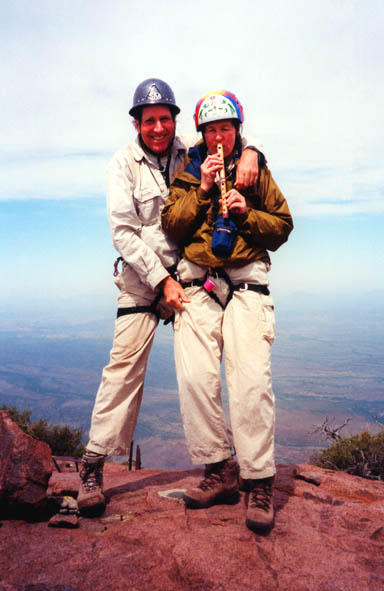 |
Gerry and Jennifer on the summit
Photo by Susan Cooper |
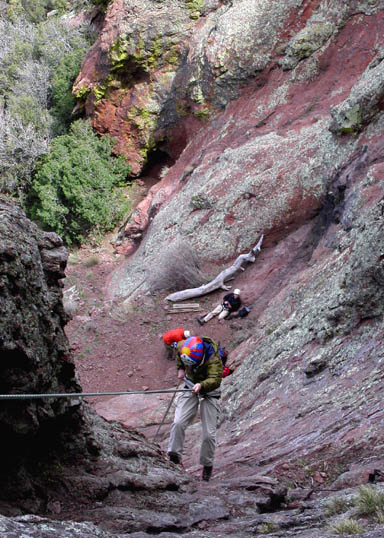 |
Jennifer rappeling down the crux pitch |
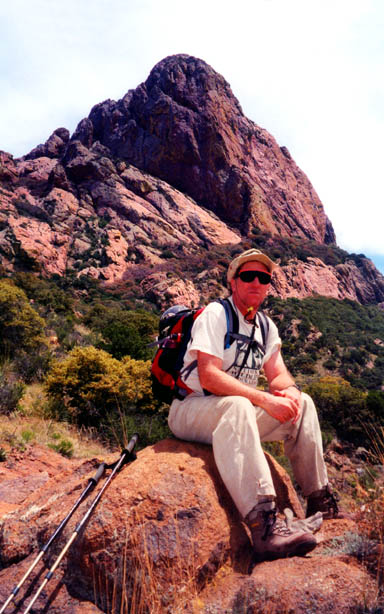 |
Gerry after the climb
You can easily see the ramp on the west face
Photo by Jennifer Roach |
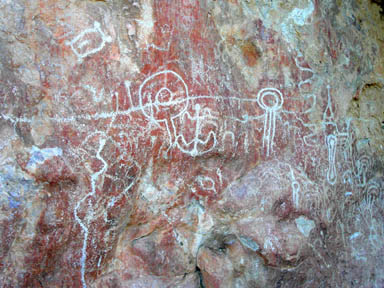 |
Baboquivari rock art |
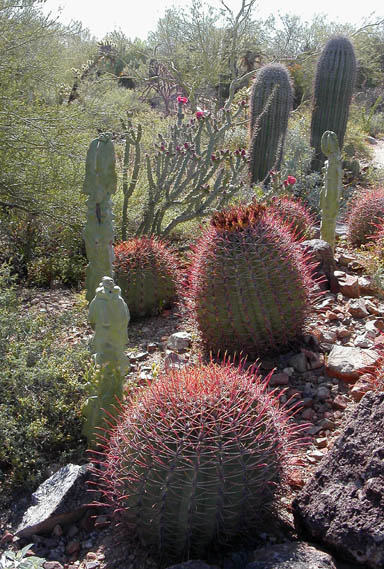 |
The sonorus Sonoran Desert |
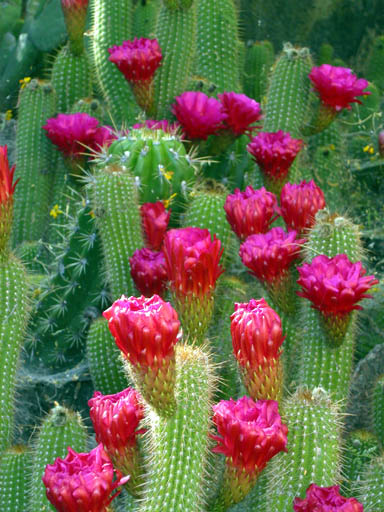 |
Sonoran spring Glory |
| Except where noted, Gerry took the above photos on 4/16, 4/17 and 4/18/04. |
USGS 7.5’ Quadrangles: Baboquivari Peak, Chiuli Shaik |
West Face – 9 miles RT, 4,200 feet net & total, Class 5.3 |
| This is the easiest route on Baboquivari. It is a hefty hike capped by a Class 5 pitch.
Start at the West Baboquivari Trailhead
south and east of Sells, Arizona. |
| From the south side of the Baboquivari Campground, follow a distinct trail leading east toward the mountain.
In the first 0.25 mile you will pass a steel water tank on your left and a stone water tank on your right.
After 0.4 mile, turn south at a trail junction. Follow the trail south, then east as it climbs
Baboquivari’s lower slopes. After rounding a corner, you can see the upper peak ahead of you.
Identify a huge ramp extending from lower right to upper left across the upper west face.
This is the lower part of the route on the upper peak.
After 3.5 miles, the trail ends at the base of this large ramp. |
| Scramble up the ramp and overcome a short Class 3 section that is 100 feet above the end of the trail.
Continue up the ramp as the angle relents and a trail reappears.
Follow the trail past the end of the ramp to the base of a 100-foot high rock wall, which is the route’s crux pitch.
This pitch faces northwest, is often icy between late November and early March, and ice on this pitch has defeated many parties
who have been surprised to find ice so close to sunny Tucson. |
| When dry, climb up near the center of the wall for 25 feet, and overcome a smooth bulge with a 3-move, Class 5.3 sequence.
These are the hardest moves on the route, and there is no protection for the leader close to the crux sequence.
Continue above the crux for another 75 feet on easier, Class 4 rock. There are several protection possibilities
on the upper part of the pitch, and there is a sturdy, 4-inch tree that provides a good anchor at the top of the pitch. |
| It is a scramble to the summit from the top of the Class 5 pitch. To do it, scramble south up an undulating ramp (Class 3),
cross a small notch, descend 20 feet to the south, and climb a steep, 8-foot crack between a large chockstone
and the wall to it’s north (Class 3). Continue scrambling east above this chockstone as the angle relents
and the trail reappears once more. Follow the trail around to the north and finally the east side of the rounded summit
for your final scamper to the highest point. |















